Edwin Hookenson: Minnesota State's Hungry Shot-Blocker
Edwin Hookenson: Minnesota State's Hungry Shot-Blocker
Minnesota State defenseman Edwin Hookenson has made a name for himself by fearlessly blocking shots.
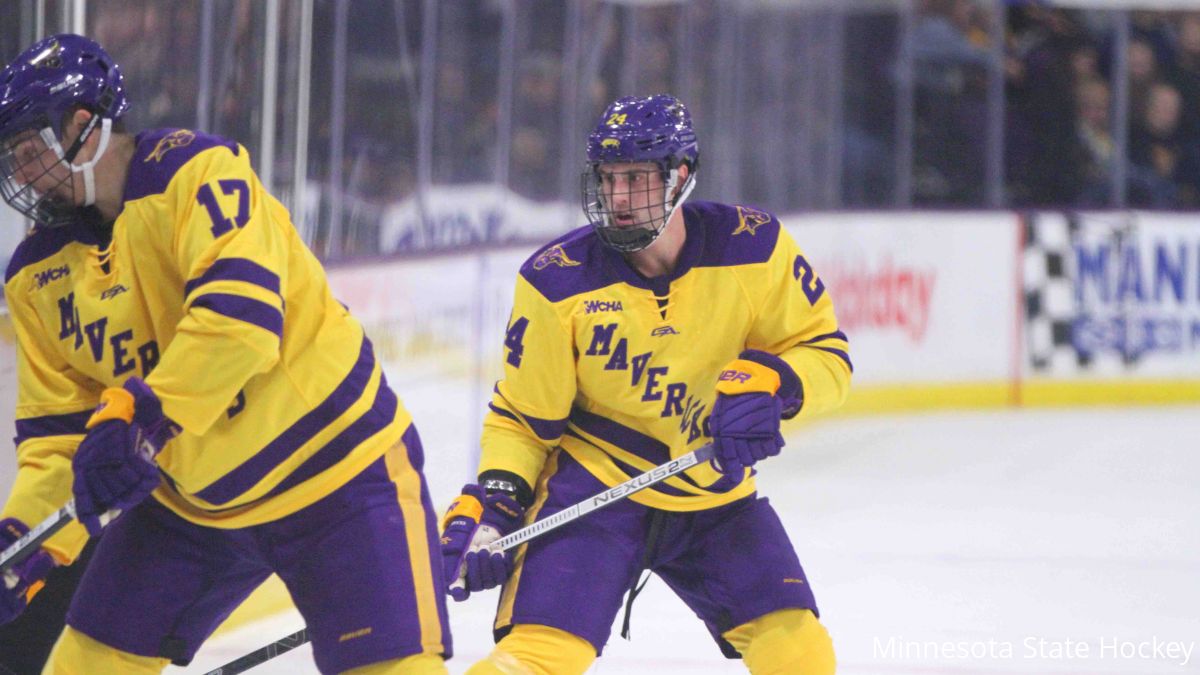
Several times a game, coach Mike Hastings and others on the Minnesota State bench find themselves commenting on Edwin Hookenson’s appetite.
Not the junior defenseman’s taste in cuisine, but his hunger for blocking shots.
“We call blocking shots ‘eating one’ and Edwin is a selfless player who has no problem sacrificing his body in that way,” Hastings said. “On the bench, we’ll say ‘Look at how Hook ate that one’ or ‘He is so great at eating shots.’ The team draws a lot of energy from what Edwin does—it fires the guys up. Blocking shots is a want-to kind of thing and everybody in the locker room respects how much he wants to.”
Hookenson has consumed a steady diet of blocked shots this season and currently sits second in the nation with 81, two back of Western Michigan’s Luke Bafia.
Some shots, of course, are harder to swallow (i.e., more painful) than others, especially those that strike above the waist or in areas of minimal padding.
“I’ve taken a few in the stomach, which sting pretty good, basically taking any puck in the upper body does,” Hookenson said. “Also, taking anything in the ankles where there is not much padding is painful, too. Obviously, I try to block shots with the parts of my body which are protected by good padding, but it does not always happen that way.”
After weekend road split at Bemidji State, Minnesota State men's hockey is rated 4th by @uscho. JR D Edwin Hookenson ranks 2nd on Mavericks with +8, 3rd in country w/36 blocked shots. Lampman, Sask., native has 2-2--4 in 12 GP. Mavericks are at @HockeyLSSU Fri-Sat. @Buccigross pic.twitter.com/lZ1zNpHolM
— Minn. St. Athletics (@msumavericks) November 26, 2018
Prime examples of that came during an early-season win at North Dakota in which Hookenson stopped a season-high seven shots, including two off his ankles during consecutive shifts, an area of precious little padding.
“I swear I thought I had broken my foot both times because the puck hit my skate so hard,” he said. “I had a little trouble standing, at first, and it stung for a little while, but I was ready to go for the next shift. It was pretty brutal, but, fortunately, there are not many like that.”
After displaying flashes of his shot-blocking ability the previous two seasons with 58 in 44 games (1.32 per game), the 6-foot, 195-pound Hookenson is now one of the country's best at what Hastings calls “the most selfless act a player can do for his team” for a simple reason.
He’s on the ice more, about 20 minutes a game.
That affords Hookenson ample opportunity to thrust himself in of front pucks. He is now averaging 2.53 blocks a game, third in the nation.
“I am playing a bigger role compared to last year when I was in and out of the lineup [healthy scratch in 15 games], including big minutes on the penalty kill,” he said. “That has resulted in more chances for blocked shots and to do other things.”
Hookenson is doing several things in addition to shot-blocking.
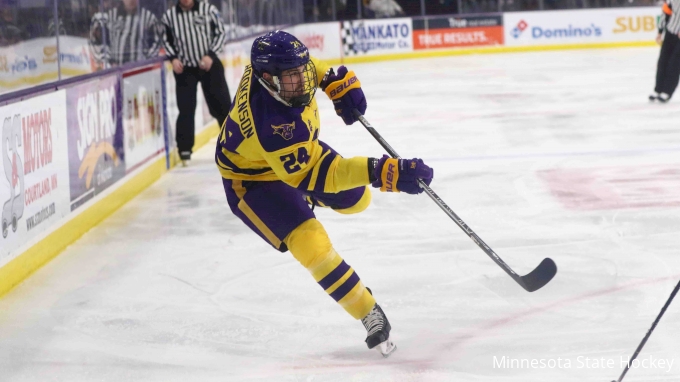
He is part of a penalty-kill unit that ranks 11th in the nation (.852) and is among those Hastings is sure to have on the ice in the final minutes of games to preserve wins—like a baseball closer. In fact, the Mavericks are giving up just 1.91 goals per game, tied for fourth in the nation, down from 2.1 a year ago when Hookenson sat out nearly 40 percent of the Mavericks’ games.
Hookenson is also tied for third among WCHA defensemen with a plus-16 rating and has a career-best nine points (three goals, six assists).
“Hook has become a true leader and is really tough mentally,” Hastings said. “He does not worry about the flashy stats like goals and assists, but focuses on anything he can do better to help the team. Edwin is someone we want out there on penalty kills and late in tight games because he has earned the trust of the coaching staff and his teammates with his stick, skating, effort and vision.”
Hookenson has missed only one of Minnesota State’s last 49 games, improving as his playing time increased.
“My defensive play has come a long way and the coaches are giving me plenty of ice time against other teams’ top lines,” he said. “I feel like I have taken big steps in trying to shut down other teams’ top players. I’ve become more confident in late-game situations and in killing penalties.”
Likewise, Hastings has become more confident in Hookenson while watching him evolve into an unwavering defensive anchor.
“Edwin’s consistency and his game have matured to the point where he is somebody the coaching staff and his teammates can really rely upon,” Hastings said. “Hook keeps himself in very good condition, is always prepared as far as knowing what other teams’ tendencies are and knows his responsibilities inside and out. He’s put himself in a position for success.”
Hookenson’s work ethic was ingrained in him while growing up on a 5,000-acre farm outside the tiny southeastern Saskatchewan town of Lampman (population 735), roughly 40 miles from the United States border.
There, the family grew mostly canola and wheat and raised cattle. Hookenson went to work for his father Reginald at a young age and quickly learned the importance of hard work and perseverance. On the farm, there was zero tolerance for making excuses or cutting corners.
“There were always plenty of chores for me to do on top of going to school and playing hockey, especially at seeding or harvesting time,” Hookenson recalled. “Sometimes, I even stayed home from school to help finish the work on time. We worked all night if that’s what it took. I learned to be responsible pretty quickly because, on the farm, Dad considered me an employee and I was held to a standard.”
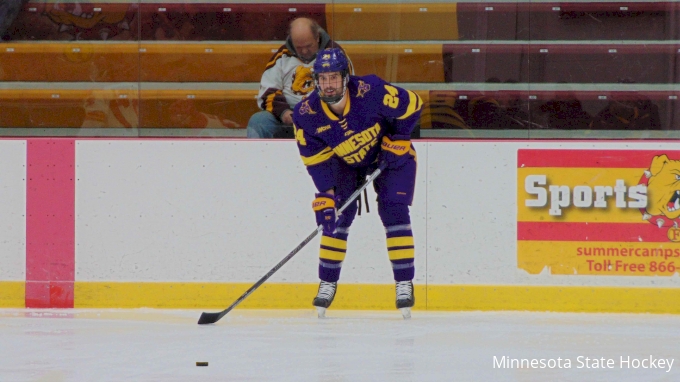
Hookenson still returns home following spring classes to help with seeding. In fact, his LinkedIn profile lists his current job as laborer at Reg-E-Dee Grain & Cattle Co., which his father founded about 25 years ago.
At the same time Reginald Hookenson was instilling an appreciation for agriculture in his son, he was introducing him to hockey. Hookenson's development was hastened by the fact that his father, a former junior player, held keys to the town’s rink.
"My dad played hockey growing up, so he wanted to introduce me to it really early—I was probably 3 or 4 years old," Hookenson said. "Because Dad could get me into the rink, not having to worry about reserving ice time was huge. It seemed like I was there whenever the ice was available, whether it was 7 a.m., lunch time or evening."
Hookenson took an immediate liking to the sport and was playing organized hockey locally by age 5.
At age 15, Hookenson moved away from home for the first time to further his develop his talents, joining the Saskatchewan Midget Hockey League’s Swift Current Legionnaires. During his three seasons there, Hookenson was named team captain and a second-team SMHL All-Star.
That was followed by a three-season stint with the British Columbia Hockey League's Nanaimo Clippers during which he was named Most Improved Player, won the Coaches Award and served as alternate captain.
Perhaps the most noteworthy aspect of Hookenson's time in Naniamo, however, was discovering his knack for blocking shots.
Knowing Hookenson's goal was to land a Division I college offer, then-Clippers coach Mike Vandekamp suggested he add that skill to his resume.
“After my second year in Nanaimo, I asked Coach what I needed to work on to be offered a scholarship, and he said blocking shots because it’s such a valuable skill for defensemen,” Hookenson said. “I probably nearly tripled my number of blocked shots the next season. It paid off.”
Sure enough, Hookenson's improved shot-blocking and other skills caught the eye of Minnesota State early in his final season with the Clippers, and he was offered a scholarship. Hookenson committed in November 2015.
“I accepted the offer within a few days,” Hookenson said. “I felt Minnesota State wanted me the most and the coaching staff really gave a good pitch about how it would the best place for my continued development. I could not be happier with the decision.”
After recording no points, 22 blocks and an even plus/minus in 19 games his first season, Hookenson improved to eight points (2-6), 36 blocks and a plus-13 in 25 games as a sophomore.
He became a lineup mainstay midway through last season, playing in 16 of the Mavericks’ final 17 games.
“I was patient and just kept working hard to earn playing time,” Hookenson said. “Eventually, the coaches started giving me more minutes as I improved and other defensemen ahead of me graduated. That gave me opportunities I've taken advantage of.”
The Mavericks, fourth in the latest U.S. College Hockey Poll, take a 24-6-2 record, including 10-1-1 in their last 12 games, into this weekend’s two-game series at Alaska Fairbanks. Minnesota State has clinched at least a share of its fourth WCHA regular-season title in the past five years with 59 points (19-4-1).
For Hookenson and his teammates, however, this season has been about redeeming themselves for the disappointing way last season ended.
The Mavericks lost their first-round WCHA playoff series to Michigan Tech before losing their first NCAA Tournament game to Minnesota Duluth in overtime. That dropped Minnesota State's all-time NCAA tourney record to 0-5.
“We believe in ourselves and want to finish the job this time because how we finished last season left a sour taste in our mouths,” Hookenson said. “Our biggest goals are winning the WCHA Tournament and becoming the first Minnesota State team to win an NCAA Tournament game. Hopefully, we can advance far into the tournament. We have the depth, talent and dedication to do that.”
Regardless of how 2018-19 concludes, a final season remains for Hookenson in Mankato.
“Hopefully, we can win more trophies next season and I’ll be doing all I can to have an even better year helping the team do that,” said Hookenson, who is pursuing a finance degree. “Our standards are high. Then, if an opportunity to play professional hockey is there, I’ll take it. If not, I’ll look at other career opportunities.”
Hastings is thankful this season is not Hookenson's last.
“Hook is about as low-maintenance as you can get from a coaching standpoint,” Hastings said. “He takes charge on the ice, in the classroom and in the weight room. Edwin stays very focused on how he can help the team. He’ll be very successful in life.”
Mark Spezia is a freelance writer based in Lapeer, Michigan, whose work has been featured in the Detroit Free Press, Hour Detroit Magazine, ESPNW.com, and Flint, Michigan-based My City Magazine.
Related Content
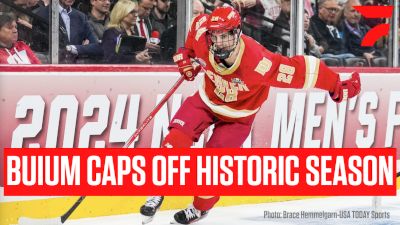 Top Draft Prospect Zeev Buium Caps Off Historic Season At Denver With National Title
Top Draft Prospect Zeev Buium Caps Off Historic Season At Denver With National TitleApr 21, 2024
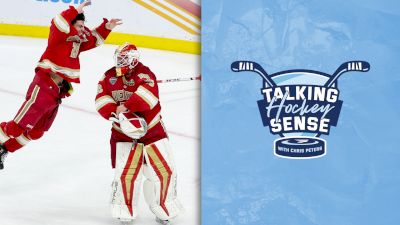 Frozen Four Recap, NHL Central Scouting Final Rankings Reaction And More. | Talking Hockey Sense, Episode 114
Frozen Four Recap, NHL Central Scouting Final Rankings Reaction And More. | Talking Hockey Sense, Episode 114Apr 17, 2024
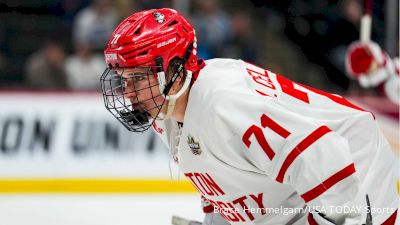 Macklin Celebrini Wins Hobey Baker Award, Becomes Youngest Recipient
Macklin Celebrini Wins Hobey Baker Award, Becomes Youngest RecipientApr 12, 2024
 When Is The NCAA Hockey Championship Game?
When Is The NCAA Hockey Championship Game?Apr 12, 2024
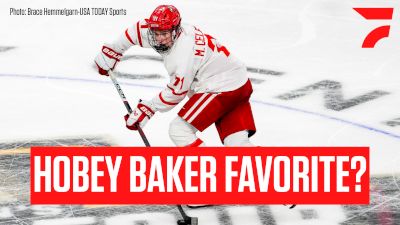 Is Macklin Celebrini The Hobey Baker Favorite?
Is Macklin Celebrini The Hobey Baker Favorite?Apr 12, 2024
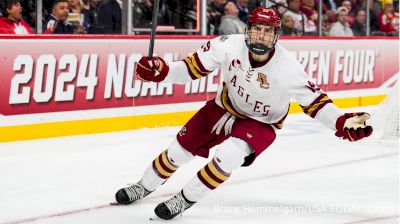 Frozen Four National Championship Game Predictions, Preview: Denver Vs. BC
Frozen Four National Championship Game Predictions, Preview: Denver Vs. BCApr 12, 2024
 Frozen Four Preview 2024: College Hockey Analyst Chris Peters Talks Boston College
Frozen Four Preview 2024: College Hockey Analyst Chris Peters Talks Boston CollegeApr 11, 2024
 Frozen Four Preview 2024: College Hockey Analyst Chris Peters Talks Denver Ahead Of Semifinals
Frozen Four Preview 2024: College Hockey Analyst Chris Peters Talks Denver Ahead Of SemifinalsApr 11, 2024
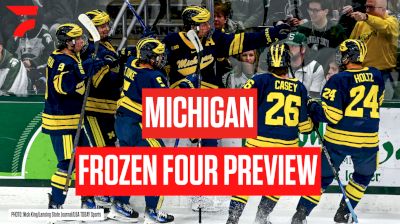 Frozen Four Preview 2024: College Hockey Analyst Chris Peters Talks Michigan
Frozen Four Preview 2024: College Hockey Analyst Chris Peters Talks MichiganApr 11, 2024